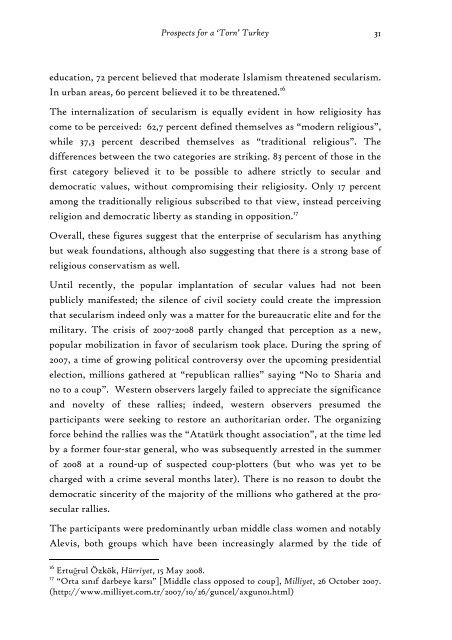2008_10_SRP_CornellKaraveli_Turkey
2008_10_SRP_CornellKaraveli_Turkey
2008_10_SRP_CornellKaraveli_Turkey
You also want an ePaper? Increase the reach of your titles
YUMPU automatically turns print PDFs into web optimized ePapers that Google loves.
Prospects for a ‘Torn’ <strong>Turkey</strong> 31<br />
education, 72 percent believed that moderate Islamism threatened secularism.<br />
In urban areas, 60 percent believed it to be threatened. 16<br />
The internalization of secularism is equally evident in how religiosity has<br />
come to be perceived: 62,7 percent defined themselves as “modern religious”,<br />
while 37,3 percent described themselves as “traditional religious”. The<br />
differences between the two categories are striking. 83 percent of those in the<br />
first category believed it to be possible to adhere strictly to secular and<br />
democratic values, without compromising their religiosity. Only 17 percent<br />
among the traditionally religious subscribed to that view, instead perceiving<br />
religion and democratic liberty as standing in opposition. 17<br />
Overall, these figures suggest that the enterprise of secularism has anything<br />
but weak foundations, although also suggesting that there is a strong base of<br />
religious conservatism as well.<br />
Until recently, the popular implantation of secular values had not been<br />
publicly manifested; the silence of civil society could create the impression<br />
that secularism indeed only was a matter for the bureaucratic elite and for the<br />
military. The crisis of 2007-<strong>2008</strong> partly changed that perception as a new,<br />
popular mobilization in favor of secularism took place. During the spring of<br />
2007, a time of growing political controversy over the upcoming presidential<br />
election, millions gathered at “republican rallies” saying “No to Sharia and<br />
no to a coup”. Western observers largely failed to appreciate the significance<br />
and novelty of these rallies; indeed, western observers presumed the<br />
participants were seeking to restore an authoritarian order. The organizing<br />
force behind the rallies was the “Atatürk thought association”, at the time led<br />
by a former four-star general, who was subsequently arrested in the summer<br />
of <strong>2008</strong> at a round-up of suspected coup-plotters (but who was yet to be<br />
charged with a crime several months later). There is no reason to doubt the<br />
democratic sincerity of the majority of the millions who gathered at the prosecular<br />
rallies.<br />
The participants were predominantly urban middle class women and notably<br />
Alevis, both groups which have been increasingly alarmed by the tide of<br />
16 Ertuğrul Özkök, Hürriyet, 15 May <strong>2008</strong>.<br />
17 “Orta sınıf darbeye karsı” [Middle class opposed to coup], Milliyet, 26 October 2007.<br />
(http://www.milliyet.com.tr/2007/<strong>10</strong>/26/guncel/axgun01.html)


